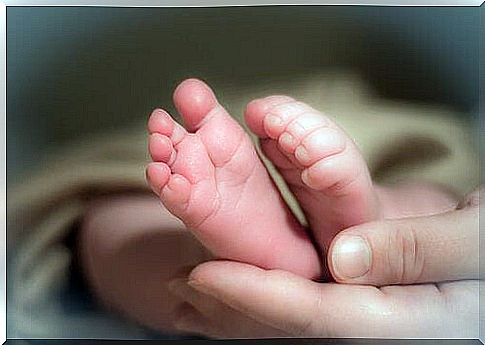Perinatal Mourning: The Harsh Reality

Perinatal mourning occurs when the baby dies a few days before or after birth. This intense pain takes the mother, her partner and even the whole family by surprise.
The pregnant woman has become accustomed to the new status of mother, is involved in the process of preparing things and the baby’s room and is looking forward to the big day. But for various reasons, the child dies and breaks everyone’s heart.
The mother, her partner and the whole family have to go through perinatal mourning together. Like the loss of a loved one, the death of the baby leaves deep emotional wounds, as well as the regret of not knowing him.
When pregnancy becomes a sad statistic

When you find out you are pregnant, you are very happy. Emotions flood you immediately, you have desires and expectations. But you need to get through the first trimester of pregnancy to make sure there is no risk of losing it.
Spontaneous abortions usually occur between 12 and 13 weeks of pregnancy. Although they cause strong emotional stress to women, this situation is not considered to be perinatal mourning.
We talk about perinatal mourning when the baby dies during the perinatal period. It lasts from the 22nd week of pregnancy to one week after birth.
Perinatal mourning takes place quietly

In addition to the intense pain caused by the loss of a child you wanted, the work environment and society do not generally recognize the perinatal grief that parents go through. Therefore, acceptance and the healing process are sometimes slower and more complex.
There are certain factors that can intensify the feelings of the woman who has just lost her child:
- Pregnancy losses or previous perinatal deaths that he failed to get over.
- The time required to become pregnant.
- The age of the woman; As the years go by, women are increasingly pressured to procreate.
- Feelings of attachment already formed, especially if the baby has already been born.
- Lack of support from society. Health insurance and hospitals usually do not provide any support during perinatal mourning.
- The absence of the father who did not take responsibility for the pregnancy.
- Impossibility to create memories with family, to give a name to the baby or to say goodbye to him.
Perinatal mourning has several phases
Perinatal mourning can last for days, weeks, months or even years. It all depends on the woman’s temperament and the circumstances in which the baby died.
As with any type of mourning, it has several phases:
The denial phase
At this stage, it is hard to believe that perinatal death occurred. The woman’s mind was not ready to receive such shocking news.
This state of shock and doubt is the result of the human mind trying to process the overwhelming reality step by step.
Anger phase

The anger phase occurs when the mother is upset and blames herself for what happened. She is angry with herself, her partner and even the doctors who came in contact with the baby.
If a woman has a religious affiliation, she will be angry with the divinity, because she does not understand how such a misfortune could have happened to her. It also happens that the mother is envious of women who have uncomplicated pregnancies and who have the chance to enjoy their babies.
Negotiation phase
This phase begins when anger becomes confusion. “If I did this or that” is a common phrase among parents who have suffered a loss.
They are constantly wondering what would have happened or could have happened if instead of doing one thing or another they had done something different to avoid the death of their child. They also constantly imagine what it would have been like if they had the child with them.
Depression phase

After the negotiation phase follows the fall into depression. In the face of the harsh reality of perinatal mourning, depression gradually sets in. For example, women feel sadness, repulsion, sleep disorders and partially or completely lose their appetite.
At this point there is also the pressure to get a new task. Many women fear that the same will happen with the next pregnancy.
Acceptance phase
This is the last phase of the perinatal mourning process. It is the moment when the woman accepts that she must continue to live, even though she has suffered such a loss.
Step by step, the woman will return to her daily activities. But it will be a long time before he wants another child or he will give up the idea completely.
Tips for overcoming perinatal mourning
If you have just lost your baby, it is important to know that you have the right to go through perinatal mourning. You have to cry, accept what happened and allow the wounds in your soul to heal.
Here are some recommendations for surviving and overcoming the perinatal grief process:
- Your doctor should give you extensive explanations for what happened. In addition, he should tell you about the consequences of this event on a possible future pregnancy.
- Don’t stop talking about the child and telling him or her on behalf of your partner, relatives, friends or co-workers. To get over the pain, you don’t have to forget about the child you just lost.
- You cry freely. Do not set dates by which you must “recover”.
- You have to do something every day to feel a little better.
- Don’t forget to take care of your physical and emotional health. If you need the help of a specialist, do not hesitate to contact him.
- Instead, no one should put pressure on you to give up the clothes and things you bought for your baby.
- The smile is healthy. Do not be scared. Don’t think that you will tarnish your baby’s memory if you allow yourself to smile and be happy.
- If you need a ritual to honor or remember your baby, nothing should stop you.

Final reflection
Perinatal mourning must be independent of the reasons for the loss of your baby. The woman, her partner and her family have the right to give themselves time and overcome the pain. Step by step, everyone will recover. You just have to be patient and wait.









